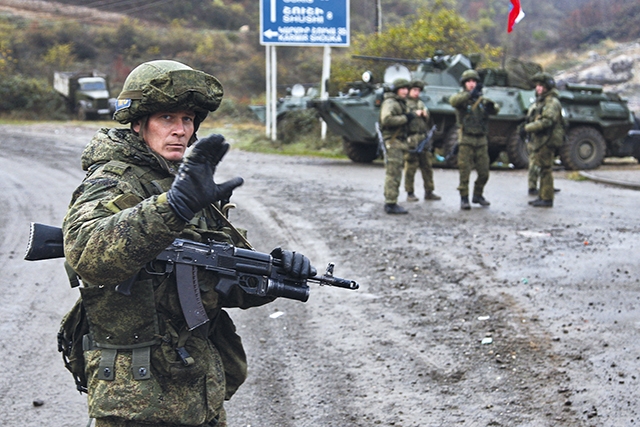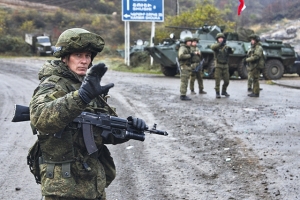Georgia in the Russian-Turkish Tensions
Op-Ed
The cessation to the fighting in Nogorno Karabakh seems to have finally brought something resembling a stable peace. However, below the surface, many analysts and defense-minded observers are not getting ready to open the champagne. With Russian forces constructing their positions, Turkish soldiers are also poising themselves for deployment to the region. These two titans of the South Caucasus have never been the best of friends, and have often found themselves on the end of each other’s bayonets. Now caught between these two is little Georgia, wondering if she will be the next casualty in the geopolitical sparring.
Armenia has petitioned, on multiple occasions, to have Russian combat forces intervene and stop the rout of their forces from the battlefield. Azerbaijan, being tactically and technically superior due to years of investment and affiliation with the West, overcame them. Armenia, stuck in 1990s soviet-style military drills, broke in front of the modern face of warfare. Now, Russian and Turkish soldiers are preparing to watch over each other down in the mountains of Karabakh.
Historically, these two have had a checkered past. Early Slavic and Turkic peoples have traded the thrusts of sabre blows as well as the impacts of musket balls for centuries. For decades, the two wanted nothing more than to throw the other out of the Black Sea forever. However, the end of the First World War saw the demise of both regimes. Fast forward to the post-Soviet world, during which Turkey remained firmly in NATO’s pocket. For a couple of decades, the two pledged to be arbiters of good in the Trans-Caucasus region. Then came Syria.
On November 24, 2015, a strike team of Turkish F-16s targeted and shot down a Russian Sukhoi Su-24M attack bomber. In the ensuing ejection and crash, the weapons systems officer was rescued during an operation carried out by Russian marines. During this rescue, another Russian marine was killed. However, the pilot was surrounded and killed by local fighters. Russia was infuriated, and Turkey claimed foul. Then Andrei Karlov, the Ambassador to Turkey was shot during a press conference at a museum in Ankara. Again, Russia steamed, but did nothing.
Now, in the wake of the Karabakh war, the two come face-to-face again with arms in hand, and Russia has already theorized what might happen. The Institute for Political and Military Analysis in Moscow published a piece that focused on the events that would unfold should the two come to blows in the Caucasus. Using strong language, they envisioned armor and air elements engaging in the Karabakh regions, but also in Georgia. They have proposed that the Armenian government, which has always aligned itself closer to the Russians, will be the instigator in this.
Through lobbying repeatedly to have Russians interfere in regional affairs, they would bring the two to war in an effort to ride the Kremlin’s coattails to victory and destabilize Georgian interests as well. Being a member of the largely ineffective Collective Security Treaty Organization, or CSTO, Russia would be legally bound to come to their aid should anything arise.
Georgia, while generally friendly with both Azerbaijan and Armenia, has far more investments not just economically but also politically, with the former. Armenia and their Russian benefactors would use the opportunity to seize control of the Caucasus entirely. A dicey gambit indeed, but one that would be the “holy grail” of the anti-NATO movement.
With Turkey as a NATO member, and Georgia a close ally, the two being supported by the West would be forced to confront the combined aggression. Even with the 102nd Military Base playing as Russia’s key force in the South Caucasus, the only quick way to support them would be a renewed invasion of Georgia. The 4th and 7th Bases in South Ossetia and Abkhazia would be first sent into to split Georgia in two along a north-south axis near Tbilisi. Curbing any counter maneuvers from Azerbaijan from the east, and Turkish support forces from the southwest would be next. Heavy fighting in Kakheti and Adjara would ensue, with Russian Battalion Tactical Groups (BTGs) being sheathed in a protective layer of Chechen, Cossack, South Ossetian, and Abkhazian irregular troops. An alliance of the remaining Georgian regular and irregular forces, Turkish Army forces, and Azeri’s overstretched military would be left to fight.
Georgia has most notably been neutral in the recent hostilities in the region, and rightfully so. However, they must realize that this does not absolve them of strategic responsibility. It can be all too easy to say the aforementioned events are outside the scope of reality, but the same can be said for many events that have already come to fruition. Strong bonds between Georgia, Azerbaijan, and the Turkish-NATO elements in the region must be reinforced. Russia is already playing their game, under their trademark shadow tactics aptly termed “maskirovka.” As it has been said of Trojans being skeptical of Greeks bearing gifts, so too should Georgians be wary of Russians in the region bearing “MC” (Russian Cyrillic initials for Peacekeeper) on their uniforms.
By Michael Godwin












